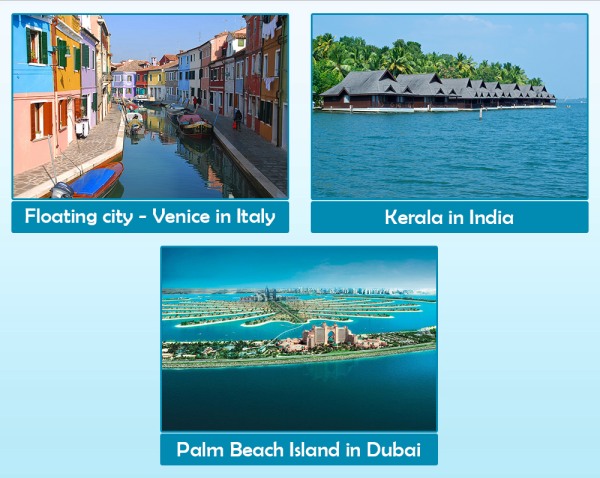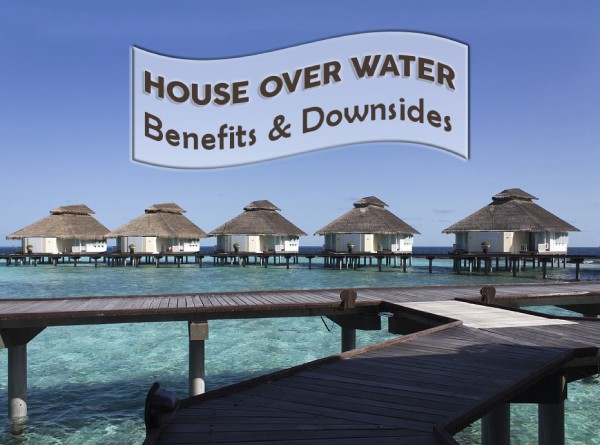Have you ever visited the cities like Venice in Italy or backwaters of Kerala in India? Where the houses are basically in water? For all those who see such houses or cities for the first time it becomes a dream for them to ever live in such a scenic house. The creative architects and bold entrepreneurs have created space like Palm Beach Island in Dubai, which partly resembles the characteristics of Venice or Kerala.

Yes, you read that right. A house over water. While it may sound like a strange idea, you’d be surprised to find that it’s a rising trend in the field of architecture. With that in mind, what exactly is it that makes building a house over water so desirable? Trends are a hit and miss thing. Sometimes they’re trendy for a good reason, other times, they’re just really horrible ideas that seem fashionable at the time but after a bit of insight, they lose their appeal.
Before we start, first let us understand the differences between houseboats and floating houses/homes before we jump to the (permanent) overwater houses.
A houseboat is defined as a self-propelled, powered vessel that is capable of maneuvering on its own. Here the houses are designed on boats and you have freedom of moving if you don’t like your setting (or your neighbours) and are usually rented. While the floating houses have stability, they do not usually move on their own, as they do not have the means to maneuver in the water, but they are able to be taken to different sites by tugboat if required. But here we are going to discussed about the benefits and downsides of permanent houses that are built over water.

This article is meant to determine whether or not building a house over water is a trend that you might want to follow or avoid. So, what is the reason behind this rise in popularity with this building style? Would its pros be able to compel you to design and build your own house in a similar manner?
These are the things that you need to factor in:
Benefits of House Over Water
The first advantage of overwater houses is that you would be able to build anywhere as long as the conditions permit it. Stable and calm waters are a must. This also means that you aren’t forced to live in an overpopulated area.
If that isn’t enough, it’s also important to note that because overwater houses aren’t technically considered real property, some states won’t require you to pay a property tax. Your real-estate agent can let you know the rules in your area.
Another benefit is you won’t need a gardener or a snow shovel when you live on the water.
Also, you are guaranteed a water view and nobody can build anything that can block the view.
Overwater houses are usually grouped into communities which can provide the sense of togetherness, security and connection while living on lake or a river.
Apart from the natural beauty, living over water offers peace as there is a comparatively less traffic. The pedestrians are absent or if the water is not deep enough, they would be minimal. The vehicle pollution is also at a minimum.
And if you have lots of free time, you can even go treasure hunting with the use of underwater metal detectors. You can also go fishing and if you have the funds, you can even do water sports near your home.
Downsides of House Over Water
Sadly, these benefits do not come without a few drawbacks, the first of which is that you’re not going to have access to a garage. It may also prove to be difficult to find transportation unless you have your own boat, unless you’re fine with swimming to land.
While you may not be required to pay a property tax, you may be required to pay other taxes like a mooring tax. While some may argue that a house is not a boat, the fact remains that owners pay for the space they are occupying. These fees may even be greater than a yearly property tax.
Besides the tax, overwater house owners will also have to pay higher insurance rates, especially since there’s always the risk of a storm. This is counterproductive if you’re trying to lower your home insurance premium.
There are also safety concerns that need to be addressed. One of which is the fact that when you live in an overwater house, there will always be the risk of falling into the water and drowning. This means that if you have children, you may need to put extra effort into childproofing your home.
The safety is the biggest concern and therefore such buildings needs special types of foundations as well as design and construction techniques. The durability of the structure, its life as well as repairs and maintenance will always be a challenge. You need to use materials which are water friendly or not adverse to water. Further the type of water, such as saline, turbid, etc. will also govern the safety and durability of the house.
Being surrounded by water doesn’t allow children any place as a playground and that may become a big bottleneck for their holistic development.
Similarly, life will be tough for senior citizens as well as for those challenged physically.
You are always prone to snake, insects etc.
If it is not an artificial pond, changing water levels due to floods and other natural hazards can be a big challenge. If it is an artificial lake maintaining a consistent water level will also be a headache.
Staying in a house over water doesn’t mean that you will not need a car or two-wheeler for your day to day work. Parking a car and reaching the car venue can therefore be a perennial hassle. You need extra space for arranging for the same.
If the water is not flowing the foul smell may be a permanent and unsolvable problem, or you need to provide fountains or some other devices to keep the water pure and odour free.
You basically need to be a swimmer to live in such a house.
Though the water may give a pleasant and cool feeling, the lack of garden and greenery would always be missing.
Due to difficult pedestrian’s movements the socialization with neighbours would be limited / restricted.
As ‘Emma Johnston’ (AO FRSN – Who is the Dean of Science at University of New South Wales & President of Science & Technology Australia, an authority in marine ecology & a former Pro Vice-Chancellor (Research) at UNSW.) spoked on BBC Future’s World-Changing Ideas Summit in Sydney (2016) “Cities have been creeping further into the ocean ever since we first starting building harbours. Land reclamation is big business and today, numerous countries are ‘taking back’ land from the sea to expand their coastlines and territory.”
She further argues that the concrete jungle “causes havoc for the marine organisms and their habitats, destroying the coral reefs that nourishes fisheries and protect the coastline from the harsher impact of the waves, and destablising many precious coastal ecosystems such as salt flats and mangroves.”
Apart from all above you will need special equipments like Boat towed metal detector, under water metal detector, magnetometer, pipe tracker etc.
Takeaway:
Living on a water provides a unique and serene lifestyle, but it does require some adjustment. The overwater houses are more exposed to the elements than house on land, so they require a new set of maintenance tasks.
So, depending on your situation, you might benefit completely from opting for an overwater house. And of course it would be your personal choice depending upon what you and your family loves and likes. On the other hand, you could be exposing yourself and your family unnecessarily to danger. With this in mind, it’s important to gauge whether the benefits would outweigh the risks. Whatever the case is, remember to maintain good building standards in order to get the most out of your investment.
